About
Our M.D. program is designed to ensure that participants graduate with a common foundation of knowledge, skills, values, and attitudes. This general professional education prepares graduates for subsequent education in primary or specialty care areas.
Quick facts
- 4 year degree.
This does not include the 4 year bachelor's degree required prior to admission to the program.
- Full-time program
- You cannot begin this program directly from high school
What you will learn
The undergraduate medical education program in the College of Medicine is a four-year program leading to the Medical Doctor (M.D.) degree. Upon earning the M.D. degree, students are then eligible to apply for postgraduate training in the discipline of their choice.
Years one and two
The first two years of medical education are called pre-clerkship. Students learn basic sciences and how to apply that learning in clinical conditions. They learn how to take medical histories and perform physical exams, first on standardized patients and then on real patients. At the same time, they are introduced to the factors that can affect both people's health and how they function in society. Students have the opportunity to participate in research and earn Global Health Certification.
Years three and four
After pre-clerkship comes clerkship. During year three, which is the first year of clerkship, students put into practice what they have already learned. They participate in clinical rotations and provide patient care both in hospital and in outpatient clinics. Clinical experiences occur not only in Saskatoon, Regina and Prince Albert, but also in rural and remote communities throughout Saskatchewan. In year four, students have further opportunities to experience different fields of medicine by participating in electives in Saskatchewan and at other medical schools throughout Canada. This prepares them for choosing a residency program at the end of year four.
The Course and Program Catalogue has the complete and official listing of required classes and their descriptions for this program.
Why study here?
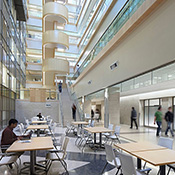
Saskatoon campus:
Health Sciences Building, University of Saskatchewan
Our Saskatoon campus is in the Health Sciences Building at the University of Saskatchewan. This state of the-art, integrated facility supports and enables collaboration among students, faculty and researchers in all health science disciplines. The building is home to the Leslie and Irene Dubé Health Sciences Library, technology-equipped lecture theatres, classrooms and research laboratories, meeting and breakout rooms, and study and lounge spaces. It also includes the Clinical Learning Resource Centre, a simulation facility for health sciences students. Students also gain experience at Saskatoon's three hospitals.
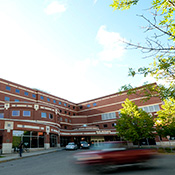
Regina campus:
Regina General Hospital
Our Regina campus is in the Regina General Hospital with access to hands-on learning and close proximity to the medical community. Residents, in addition to junior and senior medical students, are nearby and there is a low student-to-preceptor ratio. The campus is home to the Health Sciences Learning Centre, Health Sciences Library, technology-equipped classrooms, breakout rooms, study spaces, a student lounge and clinical exam rooms. It is also home to the Dilawri Simulation Centre, a state-of-the-art facility for students to practice medical situations. Students also gain experience at Wascana Rehabilitation Centre and Pasqua Hospital.
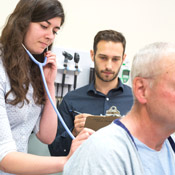
Excellence in care
The College of Medicine is committed to incorporating social accountability to direct its clinical activity, advocacy, research and education (CARE) and training activities towards the priority health concerns of local, regional, national and international communities. The college supports a number of programs and initiatives that address community health needs, including Indigenous health, primary health care, urban and rural underserved areas, gender and equity, eco-health, immigrant and refugee health and global health.
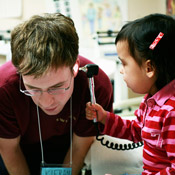
Indigenous health electives
Electives in Indigenous health that blend Indigenous and western knowledge are available in year four. These electives give you the opportunity to work in urban or rural settings with knowledge keepers, community members, and clinicians, pending availability at elective sites. You may also go off-site to assist in clinical care in surrounding First Nations communities.
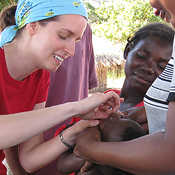
Certificate in Global Health
We offer this unique interprofessional program that combines academic courses with intense urban-based service learning experiences in urban underserved community clinics, as well as rural, remote and Indigenous communities in northern Saskatchewan and international communities. Rich in interactive, experiential, and didactic learning opportunities, this was the first undergraduate certificate in global health in Canada.

Student groups
Our college has an exceptionally active student body with leadership from the Student Medical Society of Saskatchewan (SMSS). Some examples of other diverse student groups include: Indigenous Medical Student Association of Saskatchewan, Black Medical Student Association, Medical Education Student Group. In addition, our Pre-Med Club helps students prepare for all aspects of medical school applications.
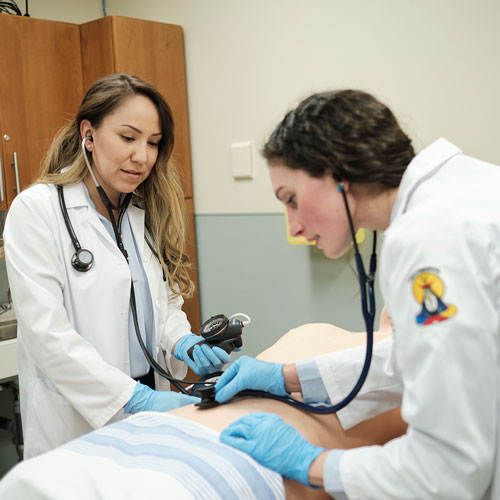
Indigenous Students
The College of Medicine is committed to increasing the number of Indigenous physicians in Canada and has developed programs and initiatives to encourage and support Indigenous students, including a mentorship program and through our Pathway Support for Indigenous Students to Pursue Medicine awards.
Careers
Residency and career options
After medical school, graduates enter into a residency program. The College of Medicine offers residency programs in primary or specialty care areas. Residency training varies from three years for certification by the College of Family Physicians of Canada to four to six years for certification by the Royal College of Physicians and Surgeons of Canada.
Student loan forgiveness and other incentives
As you pursue your medical education, be sure to research incentives that may be available to offset costs and open the door to career and continuing education opportunities.
Family doctors and family medicine residents working in rural areas and populations centres with fewer than 30,000 residents can apply for loan forgiveness—up to $60,000 over five years—toward their federal student loan balance. Learn about the eligibility requirements and application process.
Other incentives, bursaries and grants are also available to support residents/newly practicing physicians in Saskatchewan, such as the High-Demand Resident Incentive Program, Rural Physician Incentive Program, Family Medicine Resident Bursary, and more. Consult resources made available to you as you prepare to enter your residency.
Tuition estimates
Tuition and fees per year
| Tuition | $21,897 |
|---|---|
| Student fees | $1,308.24 |
| Total | $23,205.24 |
Tuition estimates reflect a typical amount you could expect to pay per year (2025-2026 rates).
Student fees are used to fund specific student benefits, including health, vision and dental coverage, a bus pass, recreational programs and fitness centre access.
Additional estimates of fees and expenses
| Additional Fees or expenses | Year 1 | Year 2 | Year 3 | Year 4 |
|---|---|---|---|---|
| Student Medical Society Fees | 500.00 | - | - | - |
| College of Physicians & Surgeons Fees | 20.00 | - | - | - |
| First Aid/BLS Certification | 135.00 | 85.00 | - | - |
| Two Step Immunization Test | - | - | - | - |
| MCCQE Part I | - | - | - | 1,500.00 |
| CARMs Fee | - | - | - | 366.56 |
| Criminal Record and Vulnerable Sector Check Fee | 75.00 | - | - | - |
| Books# | 500.00 | 500.00 | 500.00 | 500.00 |
| Electives | - | - | 1,200.00 | 8,300.00 |
| Travel/Rotations Outside of Home Site+ | 500.00 | - | 1,500.00 | 3,000.00 |
NOTE: Housing and living expenses are not included in this table.
#Amount is variable depending on the usage of EBooks, library loans, on-line subscriptions, used books, and purchased textbooks.
+Travel expenses are variable and will depend on, for example, the clinical experiences chosen, student interest group involvement, conference attendance and personal travel.
Preparing for Medicine
High school requirements
There are no specific high school requirements for the Medicine program. However, as a four-year bachelor's degree (any subject area) is required to apply for admission to Medicine.
Students should consider their degree interests and research the high school prerequisite requirements for the degree to ensure they have taken the required high school courses to complete the university-level courses.
University requirements
Read through the admission information below to see what is needed to be considered for admission. The Applicant Information Document is the official source of admission requirements, policies and procedures.
Join a Pre-Med Club
The Pre-Med Club helps students prepare for all aspects of medical school applications. They offer a range of preparatory and informative sessions such as mock MCATs, MCAT info sessions, Multiple Mini Interview (MMI) prep groups, a mock MMI, a medical school applications crash course, a volunteer opportunities info session and much more.
Who should apply?
As the only medical school in Saskatchewan, the College of Medicine exists primarily to serve the population of the province. As such, the vast majority of our seats are reserved for students with a strong connection to the province. For a detailed breakdown of admitted applicants, please review our most recent admissions statistics document. Our school values diversity and we strive to have an incoming M.D. class that reflects the diversity of our province.
Our Indigenous Admissions Pathway (IAP) is designed to support self-declared First Nations, Métis, and Inuit students from all over Canada to gain admission to Medicine. Our Diversity and Social Accountability Admissions Program provides applicants who have experienced a challenging socio-economic background an opportunity to enter the College.
DSAAP
The Diversity and Social Accountability Admissions Program (DSAAP) considers socioeconomic and other systemic barriers to achieve admission to medical school and takes these factors into account. At the time of application, applicants have the opportunity to fill out a completely confidential and voluntary questionnaire that will assess these barriers. Seven seats will be allocated to the DSAAP, which will be informed by the completed questionnaire.
Indigenous Admissions Pathway
The College of Medicine Admissions Office is committed to actively recruiting and supporting Indigenous students into medicine through the Indigenous Admissions Pathway. Diversity and equity strengthen the profession of medicine and the quality of care of patients and improves health outcomes.
Having a strong Indigenous voice in the College of Medicine and future physician work force of this province is very important as we build truth, reconciliation and relationship with Indigenous patients, families and communities. Twenty seats in the M.D. degree program each year are specifically designated for Métis, Inuit and First Nations people.
The program helps to navigate the pathways and resources available to Indigenous students as they train to become physicians.
Black Student Admissions Pathway
The University of Saskatchewan (USask) College of Medicine recognizes the need for greater diversity within the medical profession to address healthcare disparities and better serve diverse patient populations. To actively promote health equity, the college is introducing an optional Black Student Admissions Pathway (BSAP) designed to increase representation of Black students within our medical school. The BSAP will be introduced in the 2025 application cycle (for entry in 2026).
Black applicants choosing to apply through the BSAP will be required to submit an additional written personal essay as a supplemental item to their application. Information regarding the submission of the BSAP written personal essay can be found in the Applicant Information Document.
The BSAP personal essay will be reviewed by the BSAP Standing Committee to assess eligibility for the pathway. Black applicants applying through the BSAP must meet all posted admission requirements and be selected to participate in the MMI. After the MMI, Black applicants verified through the BSAP, who are granted a panel interview, will be assessed by a panel of a Black physician and a Black medical learner. Currently, there are no dedicated seats for the BSAP.
Admission information
Applicants must review the Applicant Information Document for a complete understanding of how these requirements are looked at during their application. The Applicant Information Document is the official source of admission requirements, policies and procedures.
Admission to the University of Saskatchewan (USask) College of Medicine's M.D. program requires a mixture of academic and non-academic requirements with considerations given to DSAAP and Saskatchewan Connectedness Index scores. Below is a summary of the criteria that is required for admission to the M.D. program, however, applicants must review the Applicant Information Document for a complete understanding of these requirements. The Applicant Information Document is the official source of admission requirements, policies and procedures.
Applicants must review the Applicant Information Document for a complete understanding of these requirements. The Applicant Information Document is the official source of admission requirements, policies and procedures.
MCAT
All applicants must complete the MCAT to apply for admission to the MD program. To prepare for the MCAT and to ensure readiness for the concepts covered in the first two years of the undergraduate medical curriculum, applicants are strongly encouraged to complete equivalent/similar courses in the following: Introductory level biochemistry, chemistry, biology, physics, statistics, sociology, and psychology.
Four-year bachelor's degree
Applicants must complete (or have previously been awarded) a four-year bachelor's degree (in any subject area) prior to entry into Medicine (all degree requirements must be completed by April 30th of the year of entry).
Undergraduate Academic Average (UAA)
Applicants must have a minimum University Academic Average (UAA) of 80% to apply.
Indigenous Studies prerequisite
By the application deadline, applicants will be required to have successfully completed an approved Indigenous studies prerequisite course or certificate. For the course to be considered towards meeting this requirement, the course must be listed on our approved list of courses. As courses are reviewed and approved, they will be added to the list.
Applicants must review the Applicant Information Document for a complete understanding of these requirements. The Applicant Information Document is the official source of admission requirements, policies and procedures.
Residency or citizenship
All applicants must be a Canadian citizen or have Permanent Resident status by the application deadline of October 1. Additionally, you must have lived in Canada for at least three years of your life prior to August 1 of the year in which admission is being sought.
Casper
All applicants must complete an online assessment, Casper, to be eligible for admission. Casper is an online situational judgment test that assesses numerous personal and professional characteristics.
Written personal statements
All applicants are required to submit written personal statements as a supplemental item to their application.
Reference checks
Personal attributes are assessed in part by information provided by applicant references.
CPR requirements
The College of Medicine requires that all students entering the College of Medicine complete and provide documented proof of Standard First Aid with CPR BLS and AED. For full details on CPR requirements, please view our policy.
Immunization requirements
University of Saskatchewan Health Sciences students are required to provide proof of immunizations as part of our Clinical Placement Agreement. For full details on immunization requirements, please view our policy.
Applicants must review the Applicant Information Document for a complete understanding of these requirements. The Applicant Information Document is the official source of admission requirements, policies and procedures.
Multiple Mini Interview (MMI)
The Casper score, MCAT score (including section scores), UAA, written submissions, DSAAP index, and Saskatchewan/rural connectedness index could be used to determine if applicants will receive an MMI offer.
Panel interview/conversation circle
The panel interview/conversation circle process will be conducted following the MMI, with the goal of getting to know our applicants better and to further assess communication and emotional intelligence competencies. The performance on the MMI will determine who will be invited to the panel interview/conversation circle.
Step-by-step admissions guide
There are a few parts when it comes to applying to medicine. Be sure to go through the following guide to ensure everything has been completed.
- review all information on our webpages,
- read the applicant information documents carefully,
- review the Functional Core Competencies (Essential Skills and Attributes) Required for the Study of Medicine in place for medical students,
- complete Casper during the test dates outlined on acuityinsights.app,
- complete the MCAT prior to last accepted writing time, and
- begin and complete the application during the online application dates (August to end of September).
- applicants will be notified if their application is no longer being considered,
- applicants may be invited to participate in Multiple Mini Interviews (MMIs), and
- applicants who progress past the MMI will be invited to participate in the panel interview/conversation circle.
Once all of these steps are complete, successful applicants will be sent letters of offer in May/June each year.
Applying
The Price of a Dream (POD) program was developed by the National POD Team alongside the AFMC and participating universities to address the personal and systemic financial barriers individuals face when applying to medical school. The $150 application fee and the $75 interview fee associated with a medical school application are waived through the POD program for successful applicants for the upcoming 2024-2025 application cycle to the USask College of Medicine.
The POD application portal for the 2025 application cycle is now open. The application portal will remain open until July 15, 2025 (11:59pm). Applicants to the Price of a Dream program will receive notification of their fee waiver award by July 31, 2025, ahead of the CoM’s application opening in August. Please use the links below to access the POD application guide and portal during the application window.
You may start an application, save it, and return to it any time before the application deadline. Once your application has been submitted, you cannot re-open it to make changes.
Once you have filled out and submitted your application and paid your application fee, you will be able to return to your application to upload your supplemental items (such as transcripts, proof of Permanent Residency, etc.). These are entered in the "Supplemental Items & Documents" tab on your application.
Your application will not be considered complete until you upload all necessary supplemental items outstanding, so it is recommended that you do this right away after initially submitting your application. If you are offered admission, you will be asked to have official copies of some documents (such as transcripts) sent. Instructions will be provided in your admission letter.
Log in to your account to check your application status. Once you have logged in, you will see "My application" showing in your account, which will display the status of your application.
If you need to make any other changes to your application that you have already submitted, you need to contact the College of Medicine at med.admissions@usask.ca. If you need to complete or make changes to your application that you started but did not submit, you can log back into your application and complete the changes yourself.
Ready to apply?
This program is not currently accepting applications.
College info
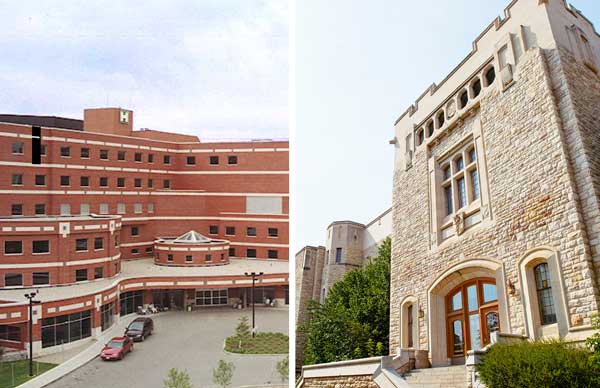
The four-year Doctor of Medicine (M.D.) is offered by the University of Saskatchewan's College of Medicine.
Established first as the School of Medical Sciences in 1926 and later as the College of Medicine in 1953, the College has a full range of academic programming, including the School of Rehabilitation Science and the Division of Biomedical Sciences. The College of Medicine serves the people of Saskatchewan by producing outstanding clinical practitioners, generating new knowledge and facilitating improved patient outcomes.
Related programs
- Biochemistry, Microbiology and Immunology
- Biology
- Biomedical Foundations
- Cellular, Physiological and Pharmacological Sciences
- Interdisciplinary Biomedical Science
- Nursing
- Nutrition
- Veterinary Medicine
If you are looking for graduate level (master's or Ph.D.) programs please consult our graduate students' website.
Questions?
Email: med.admissions@usask.ca
Admissions College of Medicine
Box 17, Health Sciences Building
University of Saskatchewan
107 Wiggins Road, Saskatoon
SK, S7N 5E5

